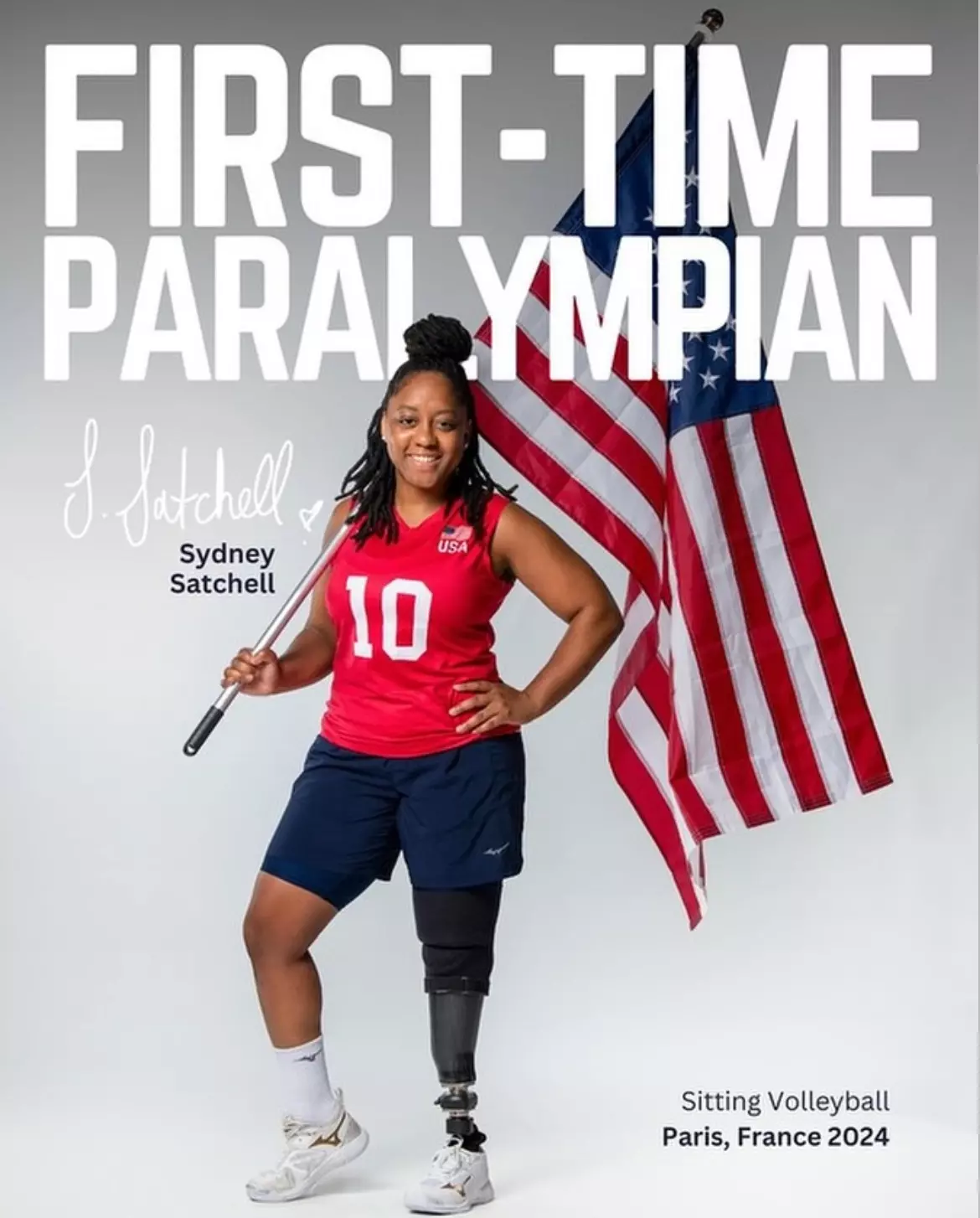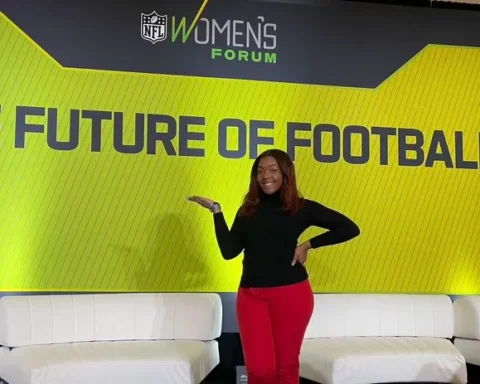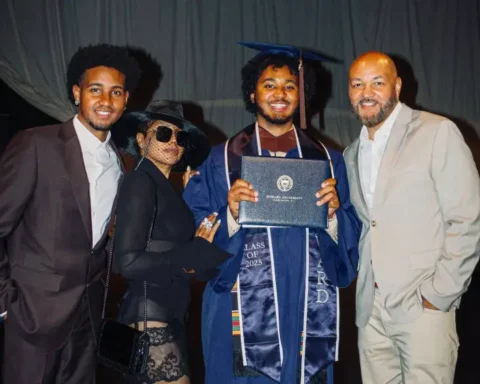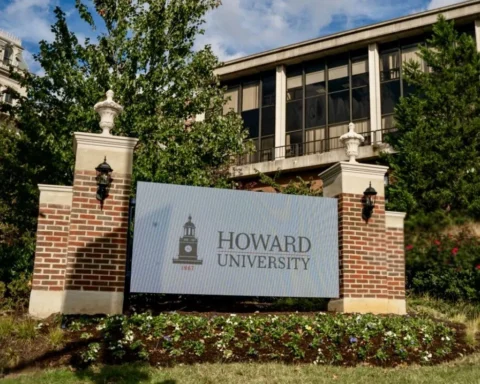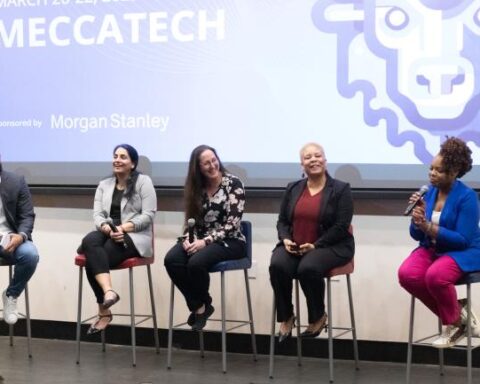By Mia Berry
Howard University alumna Sydney Satchell has had a busy month since winning a gold medal with the U.S. women’s sitting volleyball national team at the Paralympic Games in September.
She attended a parade in her honor in her hometown of Windsor, Connecticut, and threw out the opening pitch at a Washington Nationals game. An avid women’s basketball fan, Satchell also was invited to attend a regular-season Connecticut Sun game and got to meet members of the UConn women’s basketball team, a special treat for the longtime Huskies fan.
“Wanting to be at this high level as a kid and then accomplishing it in a different sport and a different game is something I am in awe about,” Satchell told Andscape. “My mom reminded me, like, ‘Do you remember when you wanted to be in the Olympics?’ I was like, oh, my goodness, because the Olympics and the Paralympics are two different organizations. They’re similar in the way that they’re respected and revered … and [I was] recognizing that I was at the same level that I wanted to be as a child, just not in the same organization.”
Satchell, who played women’s lacrosse at Howard for three years, graduated in 2014. In January 2015, she was involved in a car accident and severely injured her left leg. After multiple surgeries, Satchell made the difficult decision to amputate her left leg below the knee several weeks after the accident.
“I am grateful for this amputation,” Satchell said. “I would not change it for anything in the world, because I believe it was a blessing that the Lord allowed me to walk through that. Because I love my life way more now than I did before. I have more appreciation [and] more joy. I love bigger, harder. I forgive quicker. I have more grace for people.”
During her recovery, Satchell missed competing. She lived by the mantra, “Once an athlete, always an athlete.” Despite playing lacrosse at Howard, she liked all women’s sports and strongly supported the Bison women’s volleyball team. Although Satchell had never played organized volleyball, her passion for the sport led her to start playing sitting volleyball less than a year after her leg was amputated.
“I was very ignorant at the time and didn’t understand the value, the experience and the real career path that parasport could be,” Satchell said. “I made that decision to do some unlearning about parasport and to recognize that this was a community that I believe God intentionally put me in to spread some light on what is possible after a life-changing accident such as what I experienced.”
Learning how to play sitting volleyball still presented many challenges for Satchell. Her usual method of “fake it till you make it” to learn a new sport wasn’t working.
“I enjoyed the journey way more when I allowed myself to be uncomfortable [and] when I allowed myself to ask questions,” Satchell said. “I’m a professional athlete, so I should know about my sport. Giving myself that space to grow and to learn again and not to self-destruct because I mentally think I should be further along in this really steep curve of a sport I had really no background in … it’s different.”
Satchell worked her way through the Team USA pipeline program to become a member of the USA Volleyball women’s sitting volleyball national team in 2019. The road to the national team wasn’t easy, and Satchell said her faith and family got her through darker moments, including when she didn’t make the roster for the Tokyo Paralympics in 2021.
“I bawled my eyes out. I was upset. I was frustrated, and even in that moment I didn’t turn to myself, I turned to God. … I experienced actual peace that did not make sense in the moment but allowed me to not give up on myself,” Satchell said. “The reason I have my sanity is because of my family and friends who prayed but also made sure that I was good at every single turn, because it would have been easy and almost acceptable for me to go into a low and dark place.”
Bill Hamiter, coach of the U.S. women’s sitting volleyball team, has witnessed Satchell’s growth from when she first started playing the sport to her Paralympic debut in Paris on Sept. 7.
“I think her athletic background [and that] she played other sports helped in her overall development. She was able to read the ball real well and make those small adjustments that she needs to make,” Hamiter said. “So then it was just a matter of learning how to move effectively on the floor again, which is usually the most difficult part for most athletes. She put that effort in there. She got better and better.”
Satchell is the team’s libero, a position given to the team’s best passer. Hamiter raves about Satchell’s consistent passing and her ability to help the team with hard and fast serves.
He recalled a moment during the Paralympics when Satchell pulled aside the team’s other libero, Bethany Zummo, to encourage her during a team timeout. Despite the teammates playing the same position, Hamiter said, there was never any animosity between them.
“[Satchell is] bubbly, not only well spoken, but I would say outspoken. She’s not afraid to stand up for herself or speak her mind or to have discussions,” Hamiter said. “But she’s a hard worker as well. She’s a good team member across the board.”
Satchell’s success post-amputation hasn’t come as a surprise to Shelley Davis, former senior woman administrator for Howard. Davis, who met Satchell when she interned for the athletic department, said Satchell was a natural motivator who made people smile and laugh regardless of how they were feeling.
Hearing about her resilience after the car accident inspired Davis to work with Howard’s director of intercollegiate athletics, Kery Davis, to honor Satchell with a yearly award. The Satchell Award for Perseverance, started in 2017, is given during the annual Bison student-athlete banquet to a student-athlete who has overcome challenges during his or her collegiate career.
“She didn’t let her injury stop her from achieving greatness. … College students sometimes go through things, and they need to persevere to get through them, to achieve their goals of graduation or whatever their goals are,” Davis said. “I think Sydney’s story was just an example of how that perseverance pays off and [we were] wanting to recognize her for who she was and also celebrate Howard’s student-athletes that demonstrated the same qualities.”
Although Davis no longer works at Howard University, she is proud that the award allows a new generation of student-athletes to learn about Satchell. Davis said she believes Satchell’s character is why so many people have rallied around her.
“Sydney made you feel seen,” Davis said. “Even when she competed this summer on the Olympic team, that wasn’t just Sydney’s victory. I think everyone that Sydney ever talked to felt like it was their victory, too, because she makes you feel. She pulls you in.”
Since returning from Paris, Satchell has spoken to elementary and middle school students about her experiences and hopes to educate the youths about how different each pro athlete is.
“I am hoping that my little 5-foot-2 self is in the space that will show ‘Hey, my body looks different. I don’t have a foot, and that’s OK,’ ” she said. “I’m using my team and other para-athletes who have different types of bodies to encourage them to say, ‘Athlete doesn’t mean muscles. Being an athlete doesn’t mean a flat stomach.’ It doesn’t mean this or that you have to be a certain height or have certain things.”

